By Abigail Malangone, Processing and Reference Archivist
On the morning of September 11, 1962, President Kennedy set out from the White House to begin a tour of NASA installations. This two-day trip took him to Huntsville, Alabama, Cape Canaveral, Florida, Houston, Texas, and St. Louis, Missouri. Several months earlier, a National Security Action Memorandum assigned the Apollo program as the highest national priority for research and development and Kennedy wanted to check on its progress.
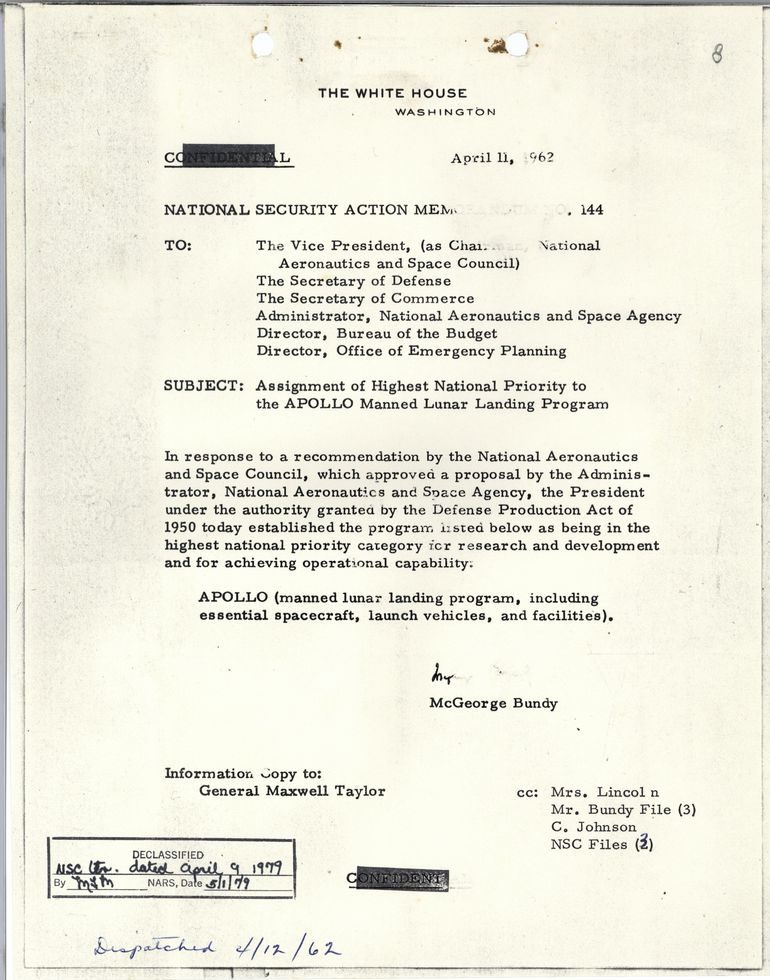
Kennedy first committed to putting a man on the moon in a special message to Congress on May 25, 1961. While progress was made in the year that followed, things were not moving fast enough. The space race was heating up and the United States was behind. One month before the trip to view NASA installations, the Soviet Union succeeded in launching the Vostok III and Vostok IV within one day of each other; this was the first time that more than one manned spaced aircraft was in orbit at the same time. In a press conference on August 22, 1962, reporters asked about the situation. Kennedy realistically described the current challenges of the space program, but added, “…I believe that before the end of this decade is out, the United States will be ahead.”
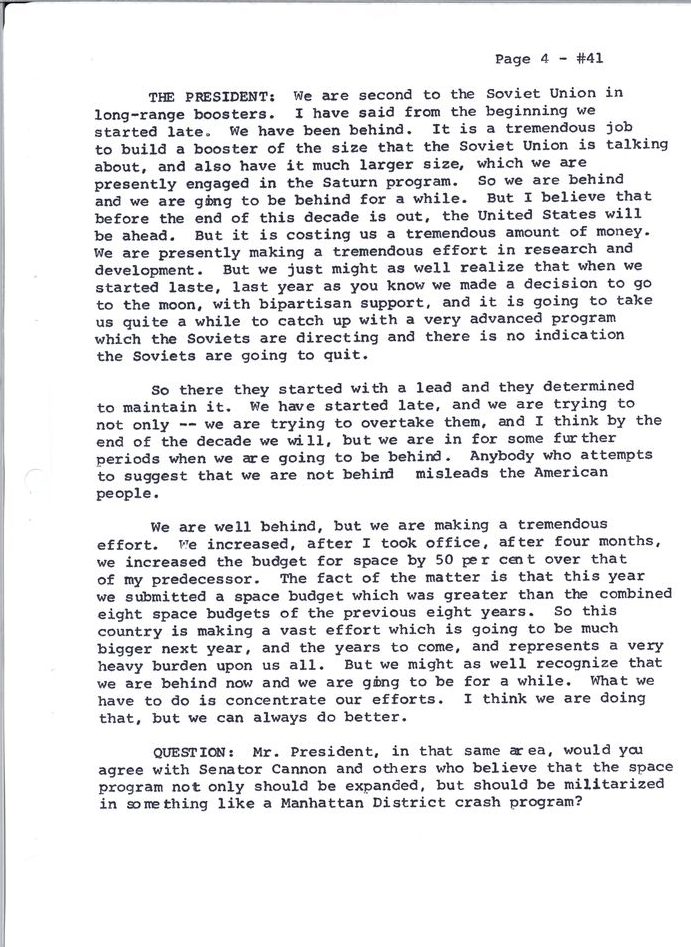
On September 12, 1962, after viewing installations in Houston, President Kennedy had an opportunity to expand upon his press conference response in a speech at Rice University Stadium. The speech, written by Ted Sorensen, stressed that the United States’ investment in and commitment to space exploration was in the national interest. Various agencies provided input, including NASA, the Department of State, and the Bureau of the Budget. Sorensen’s drafts indicate that he picked up on the themes present in the agency drafts, such as the U.S. tradition of exploration and the distinction between the peaceful and aggressive uses of space. It is interesting to note that the most recognizable line in the speech actually originated in NASA’s speech draft.
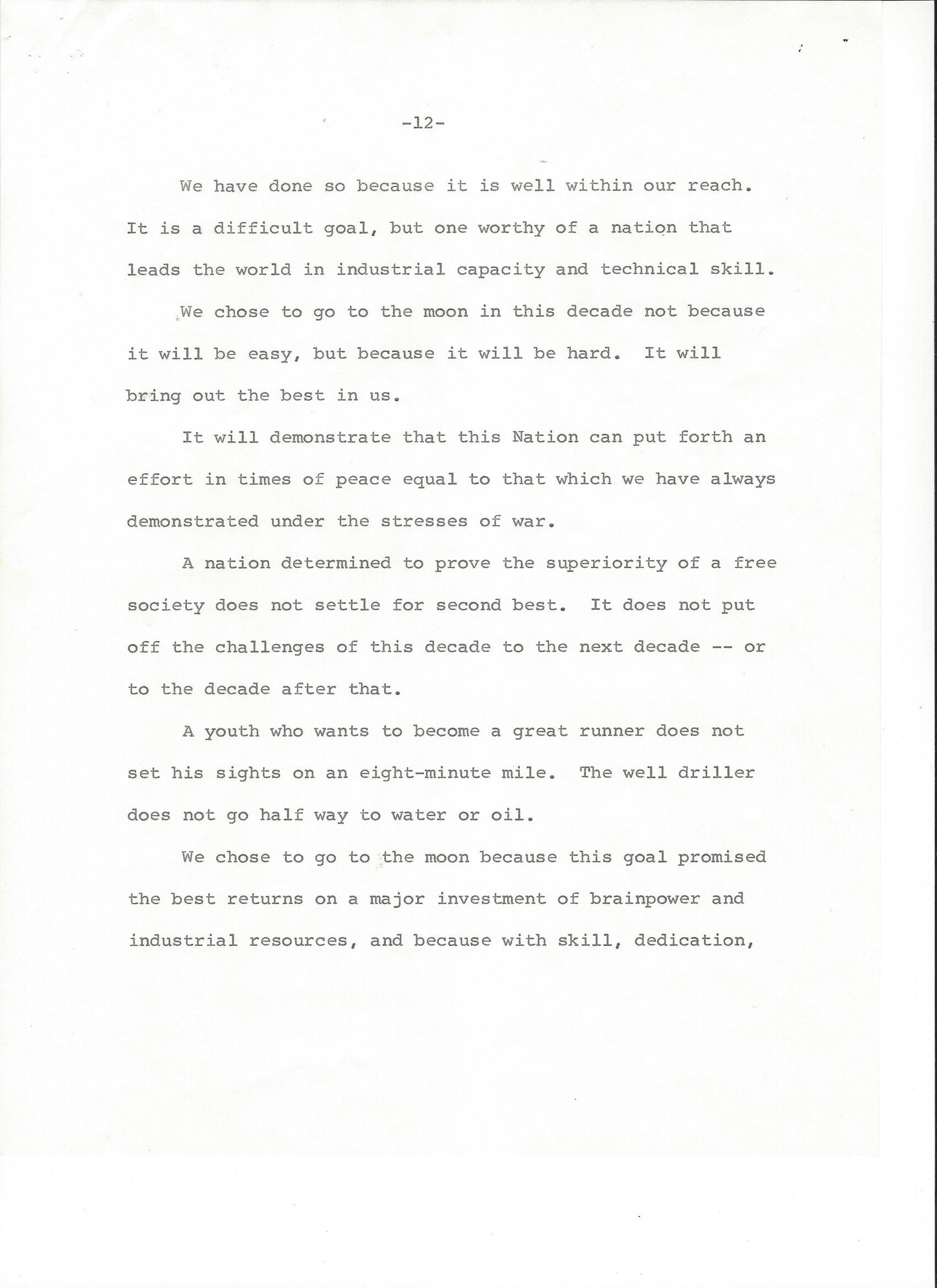
Sorensen’s first draft modified the statement to read:
“…we choose to go to the moon in this decade, not because that will be easy, but because it will be hard — because that goal will serve to organize and measure the best of our energies and skills — because that challenge is one we are willing to accept, one we are unwilling to postpone, and one we intend to win. “
This language stayed relatively intact throughout the various drafts and was modified only slightly as the speech was delivered. Tune in around the 8:30 mark to hear the line as delivered. A last minute addition of some Kennedy humor went over so well with the crowd that the now iconic line almost went unheard!
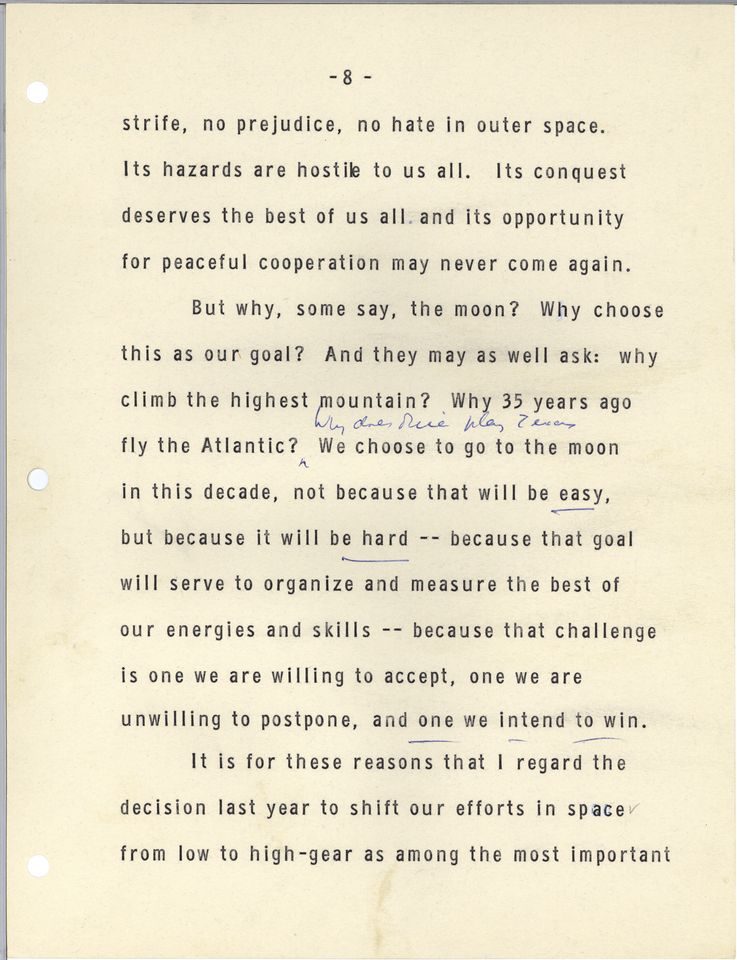
The Rice University speech is extremely popular today. In fact, we get a large number of requests to reproduce the speech for various reasons. (Go for it — it’s in the public domain!) However, available research materials indicate that this speech went relatively unnoticed at the time. It received the usual press coverage of course, but there does not appear to be an increase in mail to the White House and Sorensen’s own files do not contain responses to the speech. According to an eyewitness on the ground though, the speech was thrilling. Journalist Dan Rather – then the Bureau chief, CBS News Southwest Bureau in Dallas – provided his memory of the speech in an oral history done for the Kennedy Library. He states, “I was at Rice Stadium in Houston when President Kennedy committed us to the moon. And I remember what the grass felt like, as a matter of fact, it was a grass stadium. And it was, without apologizing, a thrilling moment. And he deliberately addressed it very well. ‘We’ll have a man on the moon before the decade is out.'”
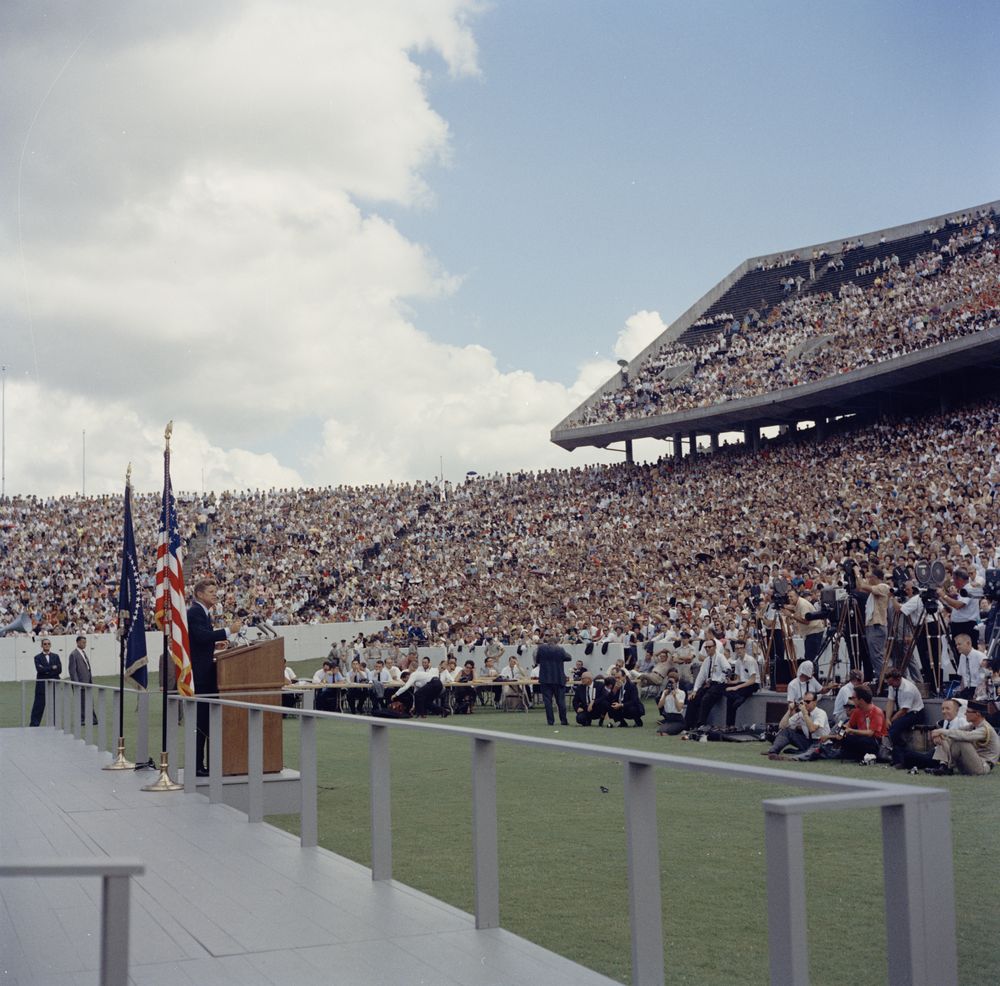
While reading the speech is one thing, the passion and urgency of the speech is most noticeable when it is listened to; this might account for Rather’s take. On this day, the 55th anniversary of the speech, take a few minutes to listen to the audio – you can even follow along with the President’s reading copy. While we all know the outcome of this commitment to land a man on the moon, keep in mind that this speech was meant to inspire at a time when it was all still ahead of them.
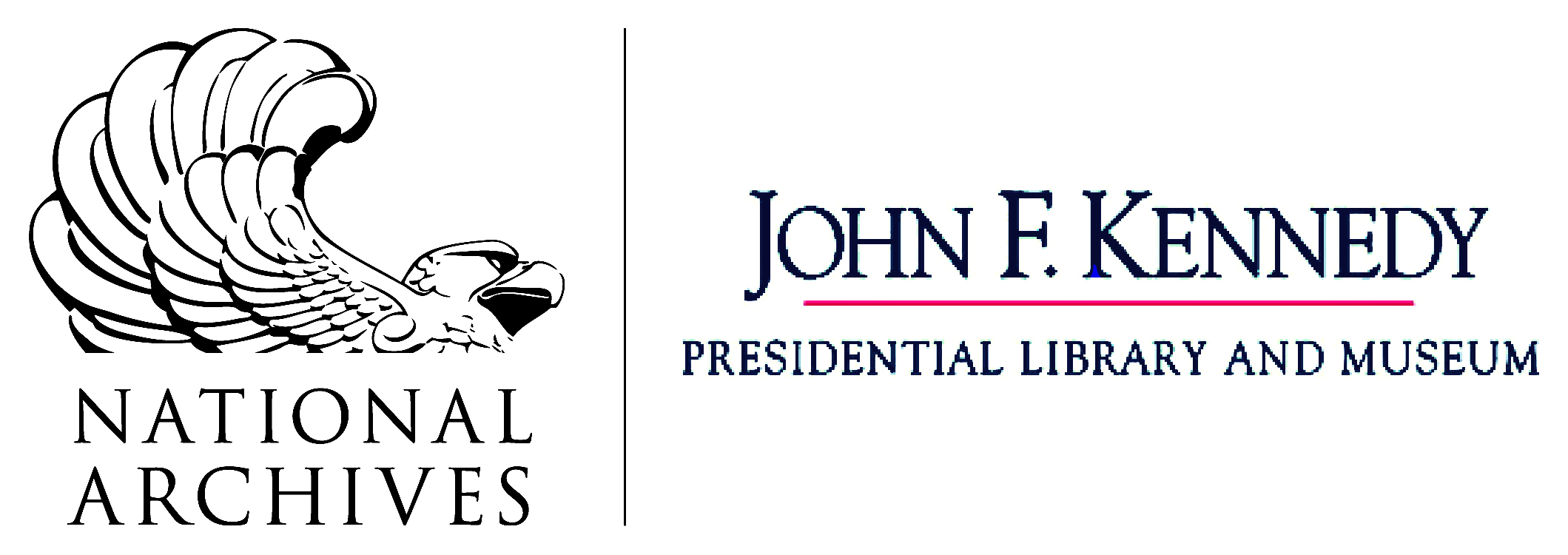
Just awesome!
[…] it, including a last-minute joke on the page below. The complete story of the speech is covered in this article at the JFK […]
Ms. Malangone/Archivist,
In this article (“We Choose to Go to the Moon,” 9/12/17) you say it’s possible to listen to the Rice speech. Sorry, I cannot find an “audio” button anywhere on the page. How do I find it?
And you mention press conference #41. I was a kid then and he held the conferences during school hours. Maybe, in the three years I saw 15 of them. Do you have audio of the press conferences? Or only transcripts? Where/how do you locate those?
I’m turning to your site and articles now as an antidote to the current insanity in Washington. Any input is welcome.
Katherine Krefft, Ph.D.
No need for this reply to go public. Just need help locating stuff.